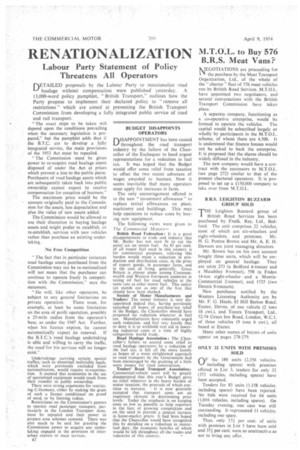RENATIONALIZATION
Page 36

If you've noticed an error in this article please click here to report it so we can fix it.
Labour Party Statement of Policy Threatens All Operators
DETAILED proposals by the Labour Party to renationalize road haulage without compensation were published yesterday. A
13,000-word policy pamphlet, "British Transport," outlines how the Party propose to implement their declared policy to "remove all restrictions" which are aimed at preventing the British Transport Commission from developing a fully integrated public service of road and rail transport.
"The exact steps to be taken will
depend upon the conditions prevailing BUDGET DISAPPOINTS when the necessary legislation is preOPERATORS
pared," but the pamphlet adds that it' the B.T.C. are to develop a fully integrated service, the main provisions of the 1953 Act must be repealed.
"The Commission must be given power to re-acquire road haulage assets disposed of under the Act at prices which prevent a loss to the public purse. Purchasers of road haulage assets which are subsequently taken back into public ownership cannot expect to receive compensation for cessation of business."
The maximum price would be the amount originally paid to the Commission for the assets, less depreciation and plus the value of new assets added.
The Commission would be allowed to use their discretion in buying haulage assets and might prefer to establish, or re-establish, services with new vehicles rather than purchase an existing undertaking.
No Free Competition The fact that in particular instances road haulage assets purchased from the Commission may not be re-nationalized will not mean that the purchaser can continue to operate freely in competition withthe Commission," says the statement.
" He will, like other operators, be subject to any general limitations on private operation. There must, for example, at least be some limitation on the area of profit operation, possibly a 25-mile radius from the operator's base, as under the 1947 Act. Further, when his licence expires, he cannot automatically expect its renewal. If the B.T.C.'s road haulage undertaking is able and willing to carry the traffic, the need for his services will no longer exist."
Undertakings carrying certain special traffics, such as abnormal indivisible loads. which were previously excluded from nationalization, would require re-examination. It seemed that economies in the use of specialized equipment would result from their transfer to public ownership.
There were strong arguments for restricting C-licensees, either by making the grant of such a licence conditional on proof of need, or by limiting radius.
Restrictions on the Commission's powers to operate road passenger transport, particularly in the London Transport Area, must be repealed and their power to prepare area schemes restored. There was also much to be said for granting the Commission power to acquire any undertaking engaged in the provision of interurban express or stage services.
B2
DISAPPOINTMENT has been caused throughout the road transport industry by the failure of the Chancellor of the Exchequer to heed urgent representations for a reduction in fuel tax. It was hoped that the Budget would offer some relief from taxation to offset the two recent advances of wages awarded to busmen. Now it seems inevitable that many operators must apply for increases in fares.
The only encouragement offered is in the new "investment allowance" to replace initial allowances on plant, machinery and buildings. This may help operators to reduce costs by buying new equipment.
The following views were given to The Commercial Motor:—
British Road Federation: It is a great disappointment to trade and industry that Mr. Butler has not seen fit to cut the penal tax on motor fuel. As 85 per cent. of all motor fuel used in this country is for commercial purposes, relieving this burden would mean a reduction in production and distribution costs, in the price of export goods, in passenger fares, and in the cost of living generally. Great Britain is almost alone among Commonwealth and Western European countries in taxing oil fuel for road vehicles at the same rate as other motor fuel. This unfair tax stands out as one of the first that should have been slashed.
Society of Motor Manufacturers and .Traders: The motor industry is very disappointed indeed that, having previously squashed all hopes of purchase-tax relief in the Budget, the Chancellor should have proposed no reduction whatever in fuel tax. Manufacturers have constantly urged such reduction, and feel very keenly that to deny it is to withhold real aid in lowering industrial costs at a time of highly competitive world trade. Road Haulage Association: The Chancellor's failure to accord some relief to road haulage operators,by a reduction of the fuel tax, is felt all the more keenly as hopes of a more enlightened approach to road transport by the Government had been encouraged by the granting of a little more money for road construction. Traders' Road Transport Association: Commercial-vehicle users will be greatly disappointed that this year's Budget gives no relief whatever in the heavy burden of motor taxation, the proceeds of which con tinue to increase. It is now generally accepted that transport costs are an important element in determining price levels. Today the emphasis is on keeping costs as low as possible to help exporters in the face of growing competition and on the need to prevent a general increase in home-market prices It had been hoped that the Chancellor would have recognized this by deciding on a reduction in motorfuel duty, the economic benefits of which would be felt throughout all the trades and industries of this country.




































































































